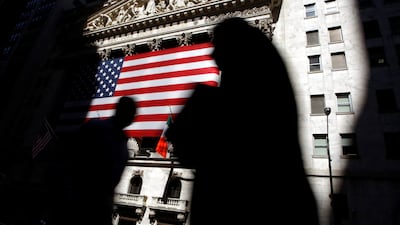Latest updates: Follow our full coverage on the US election
US markets are in for a week of volatility, as the outcome of the 2024 presidential election, battle for Congress and the Federal Reserve's looming interest rate decision all have the potential to send stock prices swinging.
Millions of voters will be heading to the polls on Tuesday to not just determine the outcome of the presidential race between Donald Trump and Kamala Harris, but also to decide which political party will control Congress. Two days later, Federal Reserve officials are expected to cut US interest rates for a second time, and Fed Chairman Jerome Powell will likely be grilled on the future path of rate cuts.
“It's certainly a big … week, given the election and given the FOMC meeting, and we can definitely see volatility as a result,” said Dan Lefkovitz, a strategist at Morningstar, referring to the Federal Open Market Committee.
Tuesday's general election between Mr Trump and Ms Harris adds a serious degree of uncertainty. Polls show the race at a virtual dead heat, with the outcome to be determined by seven swing states whose delegates will deliver the remaining electoral college votes needed to take the White House.
Peter Andersen, founder of Andersen Capital Management, believes the market reaction would be relatively muted unless the results drag on for days and uncertainty festers into Wall Street.
“All that stuff could be really upsetting to the market,” he said.
Mr Andersen compared this year's election to the 2000 race, which dragged on for months as election workers assessed the technicalities of voting ballots. Now, four years after Mr Trump sought to delegitimise his 2020 loss, Republicans are preparing to challenge any electoral defeat.
“Nobody ever was accused of interfering at the polls [in 2000], right? … So there's a whole new element of negativity that could be quite worrisome,” Mr Andersen said.
Uncertainty over how long it will take to call the race has already crept into the CBOE volatility index (Vix), which opened at 22.96 on Friday.
Vix futures are also pricing in a “fairly significant possibility” that it will take days before the president-elect is decided, said Tim Murray, capital market strategist at T. Rowe Price.
“You've got an incredibly close election, and we've heard that both sides are concerned about election integrity, so there's a … much higher than normal chance that we do have some sort of contested election,” he said.
Fed a side event?
With the election considered a dead heat, there is also the possibility that the full results will not be known by the time the Federal Reserve announces its interest rate decision on Thursday.
“If it's not known within standard time frame … then that will have a likely effect on increasing volatility,” said George Smith, portfolio strategist at LPL Financial.
“That time frame could overlap with the Fed meeting, which in itself often creates volatility, especially in the bond market.”

But Mr Smith considers the election and Fed meeting to be two different events altogether, with their outcomes seeping into the markets differently.
Mr Smith also noted this week's Fed meeting should come with less surprise, as most markets have already priced in a quarter-point cut. Anything else would be a major surprise (something this Fed does not do).
Also in focus will be Fed Chairman Jerome Powell's news conference, set to follow the Fed decision. Markets expect Mr Powell to hint at a December rate cut, but give the central bank enough wiggle room to leave the door open for a pause also.
The big question
For all the uncertainty surrounding who controls the White House, there is equal uncertainty on which party will control each chamber of Congress.
Republicans are likely to retake control of the Senate, while the race for the House of Representatives will be far more competitive, according to data collected by FiveThirtyEight.
Any party controlling both chambers is expected to spook markets, which prefer Washingtonian gridlock.
“History tells us that split government is what the market likes the best, because that means that you have less uncertainty going forward,” Mr Murray said.
He anticipates a split Congress will make it easier for markets to analyse companies “if we know what the rules are going to be”, compared to how a Democrat or Republican mandate could change fiscal policies and other priorities.
“Wall Street's become real focused on the election over the last month. I think … the big question is whether or not we get a split government or a mandate in one direction or the other,” Mr Murray said.


